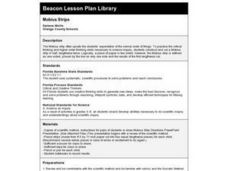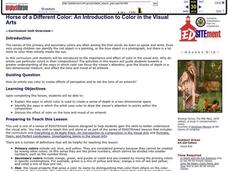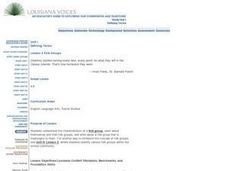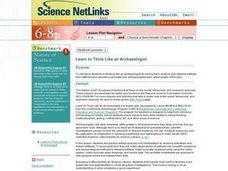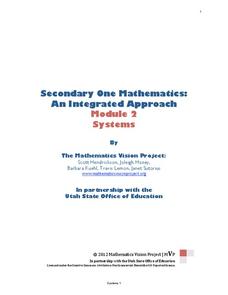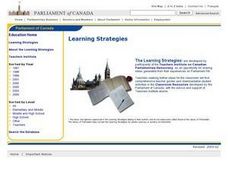Curated OER
Organizational Structures of Nonfiction Text/Graphic Organizers
Fifth graders review the characteristics of a nonfiction text. For this language arts lesson, 5th graders understand that one can use a specific graphic organizer to help them in understanding an organizational structure. For example, in...
Curated OER
The Big "Why"
Students examine the Q.& A. article found each week in the Science Times, focusing on how the answers present scientific data in a clear and logical manner. They write their own questions and answer other classmates' questions in the...
Curated OER
Mobius Strips
Students discuss the scientific method and construct their own Mobius Strips. They examine their Mobius Strip, and write observations and a hypothesis on how many strips of paper they have when they cut the strip in half length-wise.
Curated OER
The Games Robots Play
Students learn about how robots are programmed to play games. They then construct robot applications (basic computer codes) for playing tic-tac-toe comprised of if-then logic sequences. Students then compete in teams using their...
Curated OER
America's Favorite Landmarks
Students research using Google Earth a variety of websites to explore America's most prominent and famous buildings. They then compare and contrast architectural styles and write a position paper defending or arguing against their chosen...
Curated OER
Science Notebooks
Teachers can use science notebooks and other forms of writing to help students improve their understanding of scientific concepts.
Curated OER
United We Stand
Students recreate and simulate the secession of the South during the Civil War by having their class secede from the school. They write an essay comparing and contrasting the similarities and differences of everyday life before and after...
Curated OER
Visit to Nature
Students complete a science journal which contains pages in which they can predict what they think they will see before the field trip, and also pages to write down what they actually do see during the field trip.
Curated OER
Horse of a Different Color: An Introduction to Color in the Visual Arts
Students examine how artists use color to create a sense of depth in a two-dimensional space. They view and analyze prints, complete worksheets, and write a paragraph on how color is used to draw the viewer's eye to a central figure.
Curated OER
An Analysis of Jim Crow Laws and their Effects on Race Relations
First graders analyze the role of the Jim Crow laws on race relations. As a class, they are segregated based on the color shirt they have or some other simple criteria and wear either a square or circle sticker representing the majority...
Curated OER
Folk Groups
Young scholars study the characteristics of a folk group, themselves and their folk groups, and write about a folk group that is meaningful to them. They identify various folk groups within the school community and discover that...
Curated OER
Problem Solving: Story Problems
In this problem solving worksheet, 3rd graders will read and solve 6 story problems about time, money, and numbers of objects. Students must use logic, addition and subtraction skills.
Curated OER
Leaarn to Think Like an Archaeologist
Students examine how to act as archaeologists by examining artifacts. The inquiry is meant to teach learners about analysis of ancient civilizations and scientific finds. Fossil evidence is also covered to make connection to the...
University of North Carolina
Modals
If you could have any job in the world, what would it be? Modal verbs such as could and would express possibility, as the installment of a compilation of informational handouts describes. A series of tables help explain the strength,...
Mathematics Vision Project
Module 2: Systems of Equations and Inequalities
The brother-sister pair Carlos and Clarita need your class's help in developing their new pet sitting business. Through a variety of scenarios and concerns presented to the siblings, the learners thoroughly explore systems of equations...
Virginia Department of Education
Weather Patterns and Seasonal Changes
Get your class outside to observe their surroundings with a lesson plan highlighting weather patterns and seasonal changes. First, learners take a weather walk to survey how the weather affects animals, people, plants, and trees during...
Inside Mathematics
Quadratic (2006)
Most problems can be solved using more than one method. A worksheet includes just nine questions but many more ways to solve each. Scholars must graph, solve, and justify quadratic problems.
Curated OER
Phineas Gage: Questioning Strategy
Focus on chapter two of Phineas Gage: A Gruesome but True Story About Brain Science with a questioning activity. After teaching and modeling several types of questions, learners work with partners and then independently to answer and...
Curated OER
Phineas Gage: “This I Believe” Venn Diagrams After Reading Strategy
Difficulties with brain injuries still continue today. After reading Phineas Gage: A Gruesome but True Story About Brain Science, class members read a series of modern personal essays about brain injuries and choose an essay to compare...
Jen London
Julius Caesar Funeral Speech Essay Assignment
"Romans, countrymen, and lovers! Hear me for my cause." "Friends, Romans, countrymen, lend me your ears!" As part of a study of William Shakespeare's Julius Caesar, individuals as asked to compare the funeral speeches of Brutus and Mark...
Chicago Botanic Garden
Recognizing Change (Observation vs. Inference)
What is the difference between making inferences and making observations? Young climatologists refer to a PowerPoint to make observations on each slide. They record their observations in a provided worksheet before drawing a...
Chicago Botanic Garden
Climate Change Around the World
You know climate change is happening when you see a bee take off its yellow jacket. Part four in a series of five lessons explores all factors affecting climate change: temperature, cloud cover, precipitation, and carbon dioxide. By...
Biz Kids
Understanding Business Ethics
After screening an episode by BizKids, scholars show what they know about business vocabulary, then take part in grand conversations about role models and ethical dilemmas.
Curated OER
It's Debatable!
Students examine the basic elements and vocabulary of debating. They research an issue and write a letter to the editor of the local newspaper, and role-play a Parliamentary debate on a particular bill.




